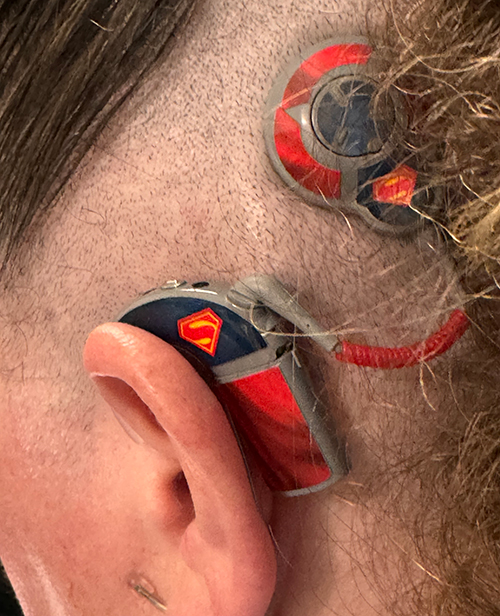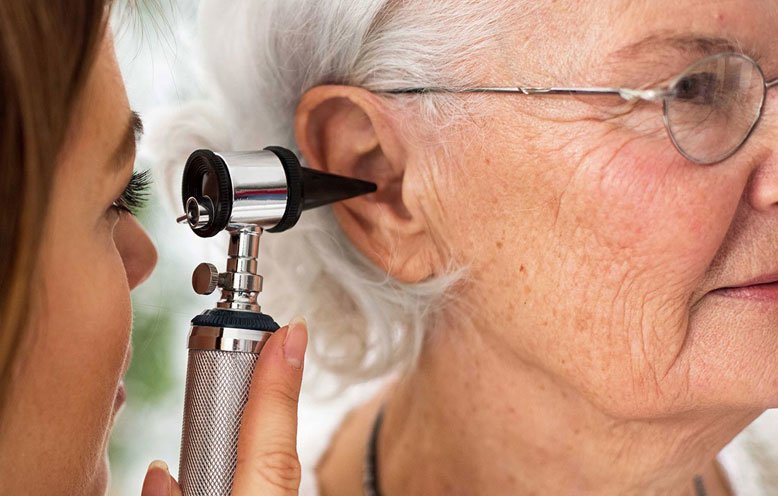Cochlear Implants
A cochlear implant is a surgically implanted electronic device that can restore useful hearing and provide improved communication abilities for individuals who receive little or no benefit from appropriately fit hearing aids. A cochlear implant transforms sound into electrical signals and uses those signals to bypass damaged portions of the inner ear and directly stimulate the hearing nerve.
The first cochlear implants were approved by the FDA in 1985. Research on these devices began in the 1950’s! More than 324,200 people around the world have cochlear implants. Today, the cochlear implant team at Henry Ford Health is able to offer you cutting edge technology including traditional cochlear implants as well as hybrid or electroacoustic cochlear implants, which allow you to use your natural low pitch hearing along with electric high pitch hearing if this technology is right for you.
How cochlear implants work
A portion of the cochlear implant is surgically implanted in the inner ear during an outpatient surgery. There is also portion worn externally behind the outer ear, much like a behind-the-ear hearing aid. This device is very different from a conventional hearing aid.
There are a number of cochlear implant devices currently available. Henry Ford Health offers all current FDA approved cochlear implant systems. The FDA approves cochlear implants for children as young as 12 months.
The implantation process
Candidacy evaluation
Before surgery, you’ll have several visits to determine if you’re a candidate for a cochlear implant according to the FDA and your insurance’s guidelines. These may include:
A cochlear implant evaluation with an audiologist
During this two hour visit, an audiologist will assess your hearing while you use hearing aids. You will be asked to repeat sentences and words. After the sentence and word testing, you will have an in-depth discussion on your candidacy, what an implant may do for you, and the process to proceed. This will include an opportunity to see a model cochlear implant.
A medical consultation with a cochlear implant surgeon
During this visit, your surgeon will assess your physical health and candidacy for surgery. You may be asked to have additional testing or clearance including:
- A CT scan or MRI
- A balance function test
- Vaccinations (talk with your surgeon for more information)
- Prevnar (PCV13) should be given first.
- Pneumovax (PPSV23) should be given 8 weeks later.
- If you have already had a Pneumovax vaccination, the Prevnar should be given at least one year later.
- Evaluation with the team psychologist
- Medical clearance from your cardiologist or primary care physician

Increased Confidence
After Jessica's cochlear implant surgery, her personal relationships improved, and her family and friends noticed her increased engagement and confidence.
Cochlear implant surgery
During the surgery, an incision is made behind the ear and a portion of the bone behind your ear is removed. This leads to the middle ear space where the opening to the cochlea (organ of hearing) is visible. A small area is exposed in the cochlea and the electrodes are inserted. These electrodes will in turn stimulate the hearing nerve. The operation typically takes a few hours. The vast majority of procedures are done on an outpatient basis.
After surgery
Shortly after surgery, you’ll meet with your surgeon for a post-operative check. About 4 weeks after surgery, your device will be activated for the first time. You will see your audiologist about 6 times in the first year of your device use and on an annual basis long-term. This include the following visits: activation, 1 week, 1 month, 3 months, 6 months, and 12 months after activation.
Adjusting to a cochlear implant takes time as it’s a completely different way of hearing. It will not restore normal hearing. Your implant will sound unusual at first but each day your hearing will improve. It’s impossible to predict how you will hear with your implant but almost all cochlear implant users report an improvement in their communication relative to their hearing aid use. Be sure to talk with your cochlear implant team to understand what types of outcomes are reasonable for you based on your hearing history.
You may be able to train your brain to hear with a cochlear implant by playing listening games or completing formal auditory training. Talk with your audiologist about these options.
With current generation cochlear implants, you may be able to have an MRI. However, you should not have an MRI without notifying the implant team. Due to the implanted magnet you may require a specialized head wrap or even a procedure prior to proceeding with an MRI. CT and other radiologic studies are not contraindicated.
Insurance considerations
If you meet the FDA and your insurance policy’s criteria for cochlear implantation, it is generally a covered benefit. Once you have completed all pre-operative evaluations and testing, insurance authorization will be requested by the cochlear implant referral coordinator. It will provide you with an estimated out-of-pocket cost including a coinsurance and deductible, if any. Please note insurances can take up to three months to review authorizations requests, though often times decisions are made more quickly.
Resources
Additional information can be obtained at the following websites:
Are Cochlear Implants an Option for You?
Dr. Laura Brainard answers a few frequently asked questions about cochlear implants, including what’s required to help you hear more naturally.

.svg?iar=0&hash=F6049510E33E4E6D8196C26CCC0A64A4)

/hfh-logo-main--white.svg?iar=0&hash=ED491CBFADFB7670FAE94559C98D7798)

